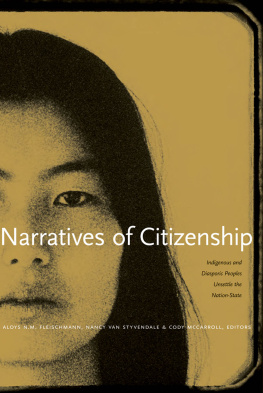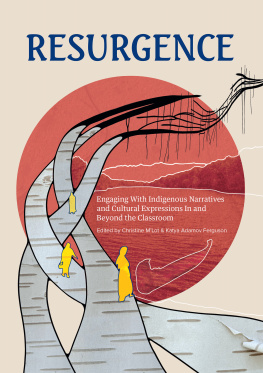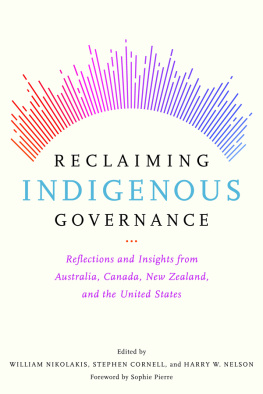Indigenous Peoples and the Geographies of Power
Tracing key trends of the globalregionallocal interface of power, Ins Durn Matute through the case of the indigenous community of Mezcala, Mexico demonstrates how global political economic processes shape the lives, spaces, projects and identities of the most remote communities. Throughout the book, in-depth interviews, participant observations and text collection offer the reader an insight into the functioning of neoliberal governance, how it is sustained in the networks of power and rhetorics deployed and how it is experienced. People, as passive and active participants in its courses of action, are being enmeshed in these geographies of power seeking out survival strategies, but also constructing autonomous projects that challenge such forms of governance.
This book, by bringing together the experience of a geopolitical locality and the literature from the Latin American Global South into the discussions within the Global Northern academia, offers an original and timely transdisciplinary approach that challenges the interpretations of power and development while also prioritising and respecting the local production of knowledge.
Ins Durn Matute, a doctoral graduate of the University of Sydney, Australia, is currently a postdoctoral fellow at the Centro de Investigaciones y Estudios Superiores en Antropologa Social (CIESAS), Mexico.
Routledge Studies in Latin American Politics
The Politics of Capitalist Transformation
Brazilian Informatics Policy, Regime Change, and State Autonomy
Jeff Seward
Negotiating Trade Liberalisation in Argentina and Chile
When Policy creates Politics
Andrea C. Bianculli
Understanding Cuba as a Nation
From European Settlement to Global Revolutionary Mission
Rafael E. Tarrag
Challenging the U.S.-Led War on Drugs
Argentina in Comparative Perspective
Sebastin Antonino Cutrona
Manipulating Courts in New Democracies
Forcing Judges off the Bench in Argentina
Andrea Castagnola
Crime, Violence and Security in the Caribbean
M. Raymond Izarali
Young People and Everyday Peace
Exclusion, Insecurity, and Peacebuilding in Colombia
Helen Berents
Indigenous Peoples and the Geographies of Power
Mezcalas Narratives of Neoliberal Governance
Ins Durn Matute
www.routledge.com/Routledge-Studies-in-Latin-American-Politics/book-series/RSLAP
Indigenous Peoples and the Geographies of Power
Mezcalas Narratives of Neoliberal Governance
Ins Durn Matute
First published 2018
by Routledge
711 Third Avenue, New York, NY 10017
and by Routledge
2 Park Square, Milton Park, Abingdon, Oxon, OX14 4RN
Routledge is an imprint of the Taylor & Francis Group, an informa business
2018 Taylor & Francis
The right of Ins Durn Matute to be identified as author of this work has been asserted by her in accordance with sections 77 and 78 of the Copyright, Designs and Patents Act 1988.
All rights reserved. No part of this book may be reprinted or reproduced or utilised in any form or by any electronic, mechanical, or other means, now known or hereafter invented, including photocopying and recording, or in any information storage or retrieval system, without permission in writing from the publishers.
Trademark notice: Product or corporate names may be trademarks or registered trademarks, and are used only for identification and explanation without intent to infringe.
Library of Congress Cataloging-in-Publication Data
A catalog record for this title has been requested
ISBN: 978-0-8153-6315-6 (hbk)
ISBN: 978-1-351-11043-3 (ebk)
Typeset in Times New Roman
by Wearset Ltd, Boldon, Tyne and Wear
Contents
Figures
Preamble
Roco Moreno
I met Ins some years ago when she was completing her Bachelor of Sociology. Accompanied by Dr Jorge Alonso, they arrived at an assembly of comuneros of Mezcala. There, she spoke, and with the approval of the Asamblea, she started a research work on politics, the autonomy of our traditional government. Ins has been a friend who for at least the last decade has been accompanying our community in those organisational processes that have been promoted to conserve the territory and the self-government of our people. Her work made me wonder: why study Mezcala? What can make the case of Mezcala visible regarding the Mexican society?
I consider that the Coca community of Mezcala, Jalisco, reflects aspects, characteristics of the native communities of this racist Mexico we inhabit today. An example of this is the discussion that exists concerning the origin of Mezcala. This community belongs to the Coca people of the Seoro de Coinan. It has been a community deprived of its origin since the arrival of the conquerors, in approximately 1533. The territorial extension that it possessed at that time was immense (from the town of La Barca to the limits with Tonal); however, currently only two communities self-inscribe to this people: Mezcala and San Pedro Itxicn. Mezcala lost its language, the Coca. According to the linguist Dvila Garibi the loss was caused by the conquerors due to the linguistic diversity that existed in this region; thus, they chose to impose the Nhuatl and Spanish as official languages, and in a few years the native language was displaced. At present, Coca is no longer spoken; it is a language that was completely lost as a result of the Conquest since there is no speaker, nor any document that allows the reconstructing of the language. There are only a little more than 100 words that are still used, as they are names of hills, animals or characters of the community.
For the indigenous community of Mezcala, the loss of their language has been a blow to their culture; however, the community has taken refuge and strengthened from what it did preserve, such as the territory, the fiestas, the historical memory and the self-government. That is, it conserves 3,600 hectares of communal land and the possession of two islands located in Lake Chapala; performs around 28 celebrations a year organised with community cargos, dances, offerings and rituals that strengthen the bonds among different members of the community (children, the youth, women, elderly, authorities); remembers and transmits the history of the community with poems, parades, writings, workshops, plays, exhibitions of historic ornaments; walks around the territory with the youngest and newest members of the village; preserves and strengthens its traditional government that is governed by its usos y costumbres, and is represented by the Asamblea General de Comuneros, the highest communal authority.
Mezcala, like many of the native communities of this country, has been deprived of a fundamental part of its culture but has managed to preserve itself against the adversities it has confronted over time. The native peoples of this racist Mexico, which through its actions discriminates against them for being a distinct culture, have had to adapt in the best way, so as to remain as people even when their laws, their lands, their language, their dress, their customs are repressed and criminalised by the different governments that have existed for the last 500 years. Mezcala is, therefore, one of those communities that have resisted and have fought to preserve the little that still remains in the middle of this war.











